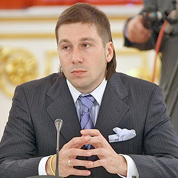The origin of ‘packed bags syndrome behavior’ among Russian capitalism titans

This statement, which later gave birth to the term, ‘the packed bags behavioral syndrome,’ underscored the overt antagonism between the Russian authorities and the local business owners. This open animosity probably resulted from the fact that contemporary Russian capitalism was ‘illegally born’ from the ruins of the Soviet command-administrative economy in the chaotic and lawless 1990s, when the lion’s share of the industrial assets of the former Communist empire were virtually taken free-of-charge by a very thin layer of the community, which was lucky to be at the right spot and at the right time during the sudden collapse of the Soviet Union in 1991.
Minority gets the ‘industrial spoil’ from the Soviet empire collapse
This ‘luck’ allowed this category of Russian citizens to get a grip on all the most lucrative enterprises and other industrial assets, specifically, from the raw material industries, through dubious privatization, which they arranged, conducted and took advantage of the best parts of the property displayed in a ‘dog-and-pony show’ of the de-nationalization of the state property conducted according to the “Chubais and Co.” recipe.
At the same time, the majority of older Soviet (Russian) citizens, who had built the aluminum smelters, oil rigs, airports and other assets that were later used by today’s oligarchs to generate their initial capital in the 1990s, gained nothing from their privatization, except miserable pensions and social benefits and subsidies on public utilities. Most of these people have long realized that they were ‘cleverly deceived’ by these so-called oligarchs, who had amassed their initial capital from the demise of the Soviet industrial assets in the 1990s via ‘dubious pseudo-legal privatization schemes’ that are mostly referred by the majority of the citizens as ‘illegal usurpation of common national properties by a greedy few.’
“The majority of older Soviet citizens, who had built the industrial assets that were later used by today’s oligarchs to generate their initial capital in the 1990s, gained nothing from their privatization, except miserable pensions and some dismal subsidies on public utilities.”
Commenting on the current situation in the Russian economy in general and in private businesses in particular, Konstantin Simonov, director of the National Energy Security Foundation, said that everyone today is fully aware, which business models in Russia, from the point of view of private entrepreneurship, generate the highest revenues for Russian tycoons. “These are the models that usually include various corrupt transactions related to the disbursement of the government’s budget. In the past, the highest revenues were generated from sharing of the state properties and industrial assets via ‘pseudo-legal and questionable’ privatization schemes.”
This public awareness of the genuine origins of the actual sources of the initial capital accumulation by today’s Russian tycoons, or the fact that everybody knows how each of Russia’s so-called ‘nouveaux riches’ got his/her enormous wealth in the lawless 1990s, has put the dubbed citizens and the oligarchs on the opposite sides of the country’s new social order. The bitter feelings of ‘blatant daylight robbery, social and economic injustice’ have not only failed to fade away after 20 years since the collapse of the Soviet empire, but have often flared up from time to time with a new intensity, fuelled by the frequent bad-mannered behaviors of the most odious of the country’s ‘nouveaux riches’ and their relatives.
On the other hand, some of these oligarchs that still have some vestiges of ‘social conscience’ intact still vividly remember the origins of their multibillion-dollar fortunes. Therefore, their sense of guilt for shamelessly ‘robbing’ their own citizens, pushing almost over 40mln of their compatriots, or about 30% of the population, below the poverty line, still remains very fresh in their memories. This helps explain the perpetual fear among the ‘nouveaux riches’ and their uncontrollable anxiety over their personal security, safety for family members and their illegally amassed capital. These anxieties often result in their inexplicable anti-social behaviors in and outside the country.
Such is the psychological burden of the oligarchs, which includes constant apprehension and their complete vulnerability to bureaucrats at all levels of the so-called ‘vertical’ power structure, as they cannot count on any support from fellow citizen that even despise them more than state officials. These constant fear and anxiety often prevent the oligarchs from having a rest of mind and/or from being fully dedicated to their core business activities, like their colleagues in foreign countries. On the contrary, the Russian oligarchs often have to deal with the so-called ‘non-typical business affairs,’ which also distract them from attending to the pressing day-to-day affairs in their business empires.
‘Packed bags syndrome behavior’ harmful to Russia and businesses
It goes without saying that this deep-rooted hatred for business owners and the ensuing ‘investophobia’ in the local  business community have adverse impacts on everything in the country. This is further complicated by the high level of ‘justified hatred’ by the majority of citizens for the ‘nouveaux riches’ on one hand, and the latter’s ‘unjustified contempt’ for the less fortunate members of the post-Soviet Russian society, on the other.
business community have adverse impacts on everything in the country. This is further complicated by the high level of ‘justified hatred’ by the majority of citizens for the ‘nouveaux riches’ on one hand, and the latter’s ‘unjustified contempt’ for the less fortunate members of the post-Soviet Russian society, on the other.
This mutual hatred had reached socially explosive limits, evident in some instances of social class wars going on in the society today. All these negative social factors have devastating impacts on the economy, which gets less capital contributions from the local business tycoons, as they are less inclined to make any serious financial commitments to their nation via long-term strategic investments in the government’s capital-intensive projects, including investments into Soviet-era social infrastructure facilities that are now in state of decay today.
Besides, a situation, where Russian billionaires are ‘not burning with enthusiasm’ to invest their cash in their own country, will make attracting foreign representatives of international businesses to invest to do so will be become a Herculean task for both the Kremlin and the Russian White House, which have announced plans and measures to involve foreign investors and their capital in the practical realization of their key signature policy - modernization of Russia and its economy.
On the one hand, most experts, including the oligarchs themselves, have eloquently explained some of the reasons for this regrettable state of affairs between the local business tycoons and authorities in the country. For one, most Russian capitalists are also not really wanted on most foreign markets, as the local champions in those foreign industries are not in a hurry to welcome Russia’s ‘moneybags’ acquired via highly questionable means into their domestic economies.
This is because like most ordinary Russians, most foreign business executives — both in the private and state sectors — are also fully well aware of how their Russian multibillionaire colleagues had ‘earned’ their current fortunes in the 1990s, that is if the verb ‘earn’ is applicable, in its traditional meaning, to what most Russia’s ‘nouveaux riches’ did in the 1990s. Consequently, most overseas business executives are not comfortable with these ‘nouveaux riches’ social and ethical behaviors, as well as their business methods and other corporate practices.
“Russian oligarchs often have to deal with the so-called ‘non-typical business affairs,’ which also distract them from completely devoting themselves to running the pressing day-to-day affairs in their business empires, like their foreign colleagues.”
This total rejection helps explain Russia’s contemporary capitalism titans’ rampant manifestation of an inferiority complex syndrome, behavioral infantilism and professional incompetence, a situation that is further exacerbated by the fact that their recalcitrant public ostracism — both at home and abroad — has so far failed to yield grounds to all their multimillion-dollar PR efforts and other programs aimed at rectifying their negative images, reputations and other damaging stereotypes commonly associated with Russian business owners abroad.
Possible exit from the situation
In practice, this means the Russian oligarchs need to do a lot more than just ‘whitewashing their reputations via PR measures. In other words, the onus is on the Russian tycoons to radically and, most importantly, positively change such negative attitudes towards them in and outside their country.
As a first step in this direction, Russia’s ‘nouveaux riches’ ought to follow the wise advice of Vladislav Surkov, the Kremlin’s influential first deputy chief of staff, and learn to adhere to modern business’ internationally accepted core principles of social corporate responsibility, stop their rampant and uncivilized practice of showcasing their wealth without a compelling need for such actions, improve their general level of social culture, and finally, try to behave in a more modest and mature and socially acceptable way in and outside Russia.












 Web design,
Web design,